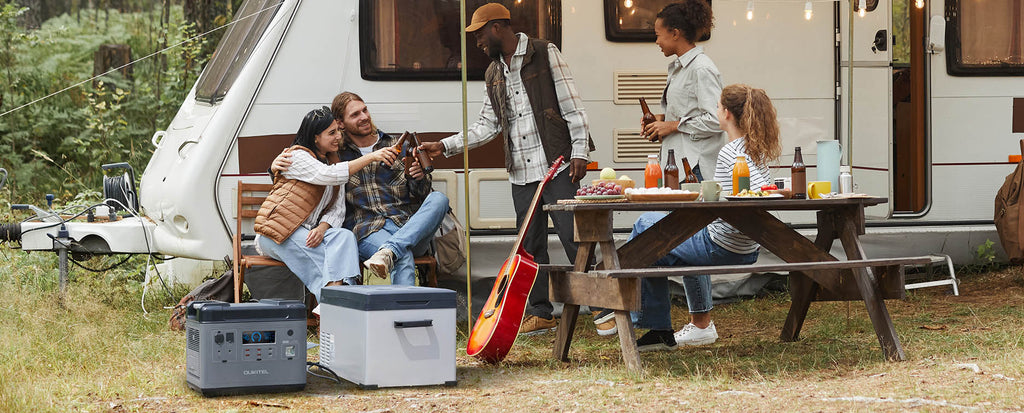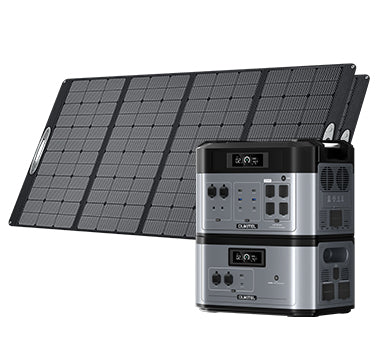What Size of a Portable Power Station Do I Need for Camping?
Navigation
- Introduction
- How to Decide the Size of a Portable Power Station for Camping?
- Other Tips for Choosing the Right Portable Power Station Size
- Conclusion
Quick Answer: For simple overnight camping with just phone charging and basic lights, 100-200 Wh is sufficient. For weekend trips with multiple devices per person, 500-800 Wh will be ideal for most families. The more days you plan to go without shore power and the more electronics you want to run, the higher capacity station you should get - up to 1000 Wh or more for off-grid weeklong trips.
Introduction
Camping is a great way to get back to nature and enjoy the outdoors. However, you'll likely still want to bring some modern conveniences like lights, phones, laptops, and other electronics. This means you'll need a portable power station to keep everything charged. But with portable power stations ranging from under 100 watt-hours to over 2000 watt-hours, how do you know what size you need? In this blog post, we'll break down how to determine the right portable power station capacity for your next camping trip.
How to Decide the Size of a Portable Power Station for Camping?
First, make a detailed list of everything you plan to bring that will need power. Consider lights, phones, tablets, laptops, portable speakers, small appliances like electric kettles or blenders, drones, cameras, GPS devices, and anything else that runs on electricity. For each item, check its wattage (how much power it draws - this should be listed somewhere on the device or in its manual). If you can't find the wattage, look up a similar device to estimate.
Next, for each device, estimate how many hours per day or per charge cycle you think you'll need to use it. Multiply the wattage by the estimated hours of use per day for each device's expected daily power consumption. Add up all of these numbers to get your total expected power draw per day in watt-hours. Make sure your estimates are on the high side - it's better to overestimate than underestimate here.
As an example loadout, let's look at a family of four going on a weekend camping trip with a pretty typical set of devices:
| Appliance/Device | Watts | Hours of Use per Day | Watt-Hours per Day |
|---|---|---|---|
| LED Lantern | 5 | 6 | 30 |
| Phone Charging | 10 | 2 (for 4 phones) | 80 |
| Laptop | 45 | 3 | 135 |
| Tablet | 10 | 1 (for 2 tablets) | 20 |
| Bluetooth Speaker | 20 | 3 | 60 |
| Digital Camera | 50 | 1 | 50 |
| Electric Cooler | 50 | 6 | 300 |
| Total Expected Daily Use | - | - | 675 |
This table clearly shows the daily watt-hours consumption of each appliance/device as well as the total expected daily electricity usage based on the given usage patterns and durations. The watt-hours column allows for easy comparison of electricity consumption across different devices. As you can see, even for a simple weekend camping trip, a family could need nearly 700 watt-hours per day for a robust loadout of devices and gadgets.

Next, factor in power loss. Power stations are not 100% efficient - some power will be lost as heat during the AC-DC conversion or due to battery chemistry limitations. For lead-acid batteries, this can be 20-30%, while lithium-ion batteries see about 10-15% loss. To be safe, estimate around 20% losses.
For our example, 20% of 675 watt-hours is 135 watt-hours. So our total estimated daily power requirement is 810 watt-hours (675 + 135).
As a general guideline for capacity:
| Battery Capacity (Wh) | Sufficient For |
|---|---|
| 100-200 | Very basic overnight camping with just lights and occasional phone charging |
| 200-500 | 1-2 nights for phones, tablets, laptops, lights, and speakers |
| 500-1000 | Several days off-grid for all of the above plus drones, cameras, and small appliances like electric coolers |
| Over 1000 | Week-long or longer trips without shore power access |
For our example weekend family camping loadout, a 500-800 watt-hour portable power station would be a good fit to account for the estimated 810 watt-hours of daily use. OUKITEL P1201 (960 Wh) would both work very well.
Other Tips for Choosing the Right Portable Power Station Size
- If car camping, weight and size are less of a concern - you can opt for a larger, higher-capacity model more easily since you don't have to carry it far. Look for power stations with capacities of 1000Wh or more to power a wide range of devices and appliances.
- For backpacking or hiking where weight matters, keep the power station under 10 lbs if possible.
- Don't forget solar panels! Pairing your power station with 1 or 2 foldable 100W portable solar panels enables unlimited recharging during daylight hours. This can greatly extend your off-grid runtime. Having 200W+ solar input is highly recommended for most users.
- Compare power outputs - some stations can run larger devices like mini-fridges, blenders, or electric grills by having 1000W or more AC outlets. If running high-draw appliances is important, pay close attention to the continuous and surge power outlet ratings.
- Evaluate the ease of recharging - if you plan to often recharge from your car while traveling, look for a station with a variety of input recharging options like 12V car ports, AC wall adapters, and solar/generator inputs.
- Check the inverter type - pure sine wave inverters offer cleaner power for sensitive electronics like laptops. But they're more expensive. Square wave inverters are fine for basic charging and devices.
Considering these factors will help you select the best portable power station with the right features, size, capacity and expandability for your specific camping and outdoor power needs. Let us know if you need any other advice!
Conclusion
Carefully considering your expected power needs and choosing the right-sized portable power station is crucial to keeping your devices charged and powered while off the grid. Follow this guide to pick the perfect camping companion for any adventure!





























 OUKITEL Solar
Extension Cable
OUKITEL Solar
Extension Cable





Dejar un comentario